Advocates for Homeless Appeal to County
Washtenaw County board of commissioners meeting (Jan. 22, 2014): About two dozen people – including members of Camp Misfit and Camp Take Notice – turned out at the county board’s Jan. 22 meeting to advocate for improved services for the homeless.
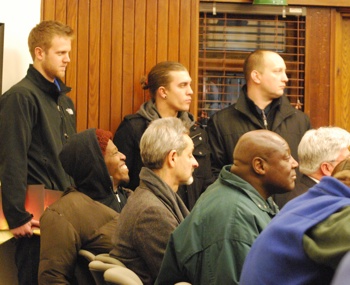
Some of the crowd at the Jan. 22, 2014 Washtenaw County board of commissioners meeting. (Photos by the writer.)
Speaking during public commentary, several people argued that the Delonis Center‘s warming center should be made available when temperatures are lower than 45 degrees. One woman presented a list of specific requests for expanded services at the homeless shelter, including 24-hour access to shower facilities and increased hours for access to laundry facilities.
There was no formal agenda item on this issue, but several commissioners agreed that the community needs to do more for the homeless. Conan Smith (D-District 9) noted that county had a 10-year plan to end homelessness, “and then we got socked by a terrible economy and made pretty dramatic reductions in the county’s spending.” [The Blueprint to End Homelessness was adopted in 2004 but appears to be dormant.]
The board ultimately voted to direct county administrator Verna McDaniel to address issues related to services for the homeless. They’ll be getting an update at their Feb. 6 working session from Ellen Schulmeister, director of the Shelter Association of Washtenaw County, which runs the Delonis Center.
Alicia Ping (R-District 3) cautioned against the county overstepping its bounds, and pointed out that the shelter is run by a separate nonprofit – although the county owns and maintains the building where the shelter is located at 312 W. Huron in Ann Arbor, and contributes some funding. Ping noted that the county also currently pays the Ann Arbor Downtown Development Authority for several parking spaces used by Delonis Center employees, and suggested that the money might be better spent on direct services to the homeless. The county is continuing to negotiate its parking contract with the DDA.
Also at the Jan. 22 meeting, the board made a range of appointments, including confirmation of Dan Ezekiel, former Ann Arbor greenbelt advisory commissioner, to replace Nelson Meade on the county parks & recreation commission. And former state legislator Alma Wheeler Smith was appointed to fill an opening on the southeast Michigan regional transit authority (RTA) board. Richard Murphy – one of two RTA board members from Washtenaw County – was not seeking reappointment. Smith was the only eligible applicant and is the mother of county commissioner Conan Smith, who abstained from the confirmation vote.
In addition, during the Jan. 22 meeting the board created a new committee to explore the cost to the county for providing employee health insurance coverage for autism. The board had received a staff presentation earlier in the evening about the possibility of offering such coverage.
In other action, the board gave initial approval to a proposed ordinance that would allow the county to issue municipal civil infractions for owning an unlicensed dog, with a final vote expected on Feb. 5. The ordinance could take effect 50 days after that, in late March, but county treasurer Catherine McClary indicated that her office would be looking to implement the changes in June or July. Several commissioners advocated for educational outreach to ensure that residents – especially in rural areas – will be aware of the changes.
The board also gave initial approval to establish a countywide Property Assessed Clean Energy (PACE) program, after hearing from several people during public commentary who supported the effort. A final vote to establish the program is expected at the board’s Feb. 5 meeting.
Services for the Homeless
Although there was no agenda item directly related to the county’s support for services that aid the homeless, the issue was the focus of public commentary on Jan. 22, and of subsequent response from the board.
Eight people spoke during public commentary about issues facing the homeless and those living in poverty.
One man described his 37-year-old son who suffers from bipolar disorder, schizophrenia and short-term memory loss. For the past 8 or 9 years, the son has lived at the Embassy Hotel, at the southeast corner of Huron and Fourth. Out of his son’s roughly $700 per month disability check, the hotel is charging almost $650 for a small room with furniture in disrepair, he said. There are patches on the wall that aren’t painted, a stained lampshade, and a small refrigerator that doesn’t work properly. The hotel management talks down to his son in a degrading way, and sometimes doesn’t let his son into the hotel at night if he forgets his key. “So he’s on the streets until seven o’clock in the morning,” the man said.
After other expenses, his son only has about $10 a week for food – “that’s criminal and shameful,” he said. Some people say that living there is his son’s choice, but where else would he live? “There’s no affordable housing in downtown Ann Arbor that he can afford.” This is a problem, and it’s not just his son, the man said. “You’ve got to do something about this.”
One woman spoke as a representative of people who use the Delonis Center shelter and its warming center. The warming center operates only six months out of the year, she said. But every human being has the right to be protected from the elements, and to have access to food, clothing, computers, and medical care. The Delonis Center isn’t meeting those needs, she said. The woman ticked through a list of requests, which she also provided to commissioners in writing:
- 24-hour access to shower facilities.
- Increased, flexible hours for laundry access.
- An immediate review of the trespassing policy.
- More flexible hours for storage access.
- Breakfast and snacks for people who use the warming center.
- An end to the policy that requires people to leave the center during the day. The center should be used in the daytime for reading, computer use and other inside activities.
She requested a response from commissioners within 72 hours about their intent to implement these proposals.
Tim Green introduced himself as a member of Camp Misfit and a board member of MISSION. There aren’t adequate services for the homeless in Washtenaw County, he said. But his biggest concern now is the freezing temperatures and the lack of adequate access to the warming center. According to the Centers for Disease Control, he said, hypothermia can set in at 45 degrees. “Do you put your dog outside for 8-10 hours, like they expect these people to do?” he asked. “You’d be put in jail for animal cruelty.” But people are on the streets with nowhere to go. The community needs a daytime warming shelter and a larger shelter for the night, he said. He’s been homeless in the past, and he continues to help people when he can. A friend of his froze to death last year because he had a drinking problem and couldn’t get into the Delonis Center, Green said. Alcoholism is obviously a disease, he said, and there should be a place to help people who need it, so they won’t freeze to death. Something needs to be done, he concluded.
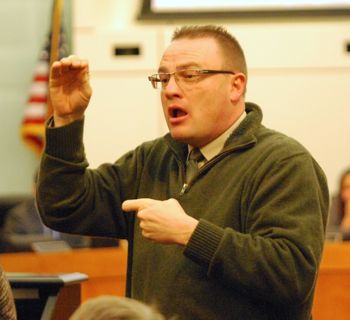
Jeff Plasko provided sign language interpretation at the Jan. 22 meeting of the county board. It’s a service that the county pays for upon request.
Steve Carnes told commissioners he’s lived in Ann Arbor for about 10 years, and the previous speaker had addressed most of the issues he wanted to raise. He asked people from Camp Take Notice and Camp Misfit to stand or raise their hands – about 20 people indicated they were part of those groups. He noted that there needs to be a timely appeals process when people are asked to move their tents because of trespassing. He knows of cases that have extended over three months.
Odile Huguenot Haber said she’s been a Washtenaw County resident for about 20 years. About 65 people are sleeping on the floor of the Delonis Center, she said, plus 25 people sleeping at the rotating shelter in local churches. She told commissioners that she didn’t know if they’ve slept on the floor recently, “but it’s not great.” Some people are senior citizens, or disabled, or mentally ill, she noted. It’s crowded and not comfortable. It’s better than sleeping outside, but she pointed out that not everyone has a space inside. Haber called for a countywide meeting of all the stakeholders about homelessness to offer something better than what’s available now. “We’re not in Syria,” she said. “We’re in Ann Arbor in the United States. We can do much better.”
Speaking as a member of Camp Misfit, Tracy Williams said they keep getting pushed out of their tent homes. It happened to some friends of his recently. The city has money to “throw around for all the buildings in Ann Arbor,” he said, but they can’t fix a streetlight. People who have a place set up for the winter are having to move because neighbors feel threatened since there’s not adequate lighting, he said. Where are those people going to go? Are they going to the cemetery?
Greg Pratt introduced himself by saying “I live in Andy’s district” – District 7 in Ann Arbor, represented by Democrat Andy LaBarre. There are people freezing outside, and they’re being evicted, he said. They need warm places to go that aren’t necessarily in the homeless shelter. People who were attending that night’s meeting are speaking from a place of strong emotion, Pratt said. “There’s people’s lives on the line.” The Delonis Center needs to set the “weather amnesty” at 45 degrees – and people should be allowed to stay there even if they blow over 0.1 on a breathalyzer, he said, or have behavioral problems. Pratt added that he knew there were at least a few commissioners who wanted to help out, so he urged them to do what they can.
Speaking through a sign language interpreter, Tony Galore told commissioners that they should do whatever they can, either providing funds or building another shelter. People need to be helped, he said, “and we would help you back later.” He said raised the issue of transportation, saying he was from Miami and you could get anywhere you wanted to go there. In Michigan, it’s not so easy, he said. “To me, it’s backwards here.” He urged commissioners to help people who need access to transportation.
Services for the Homeless: Board Response
Conan Smith (D-District 9) thanked people for coming and telling their powerful stories. Addressing the challenge of homelessness needs to be a priority in these hard economic times, he said. There’s no excuse for the county not to allocating some funds for this purpose, Smith added. It’s not about how cold it is, he said – people deserve a home if they want one.
The county needs to adopt public policy and investment strategies reflecting that housing is a right, Smith said. The community needs systemic solutions, he added, and not simply respond to a crisis. They need to address the causes of homelessness, not just the symptom. The county had a 10-year plan to end homelessness, he noted, “and then we got socked by a terrible economy and made pretty dramatic reductions in the county’s spending.” [.pdf of the 2004 Blueprint to End Homelessness] Smith said the county would be doing what it could.
Yousef Rabhi (D-District 8) said the situation that was described about conditions at the Embassy Hotel sounds “appalling” and something that he hoped the county staff could look into. Thanking others who’d spoken on behalf of the homeless, Rabhi said “it’s a human issue, and one that we can’t back away from.” It’s been a priority for Washtenaw County since he’s been on the board and even before that, he said. Other communities don’t provide the same level of support for the homeless, he noted. Nobody was turned away from the Delonis Center when temperatures dropped, he said. Even so, he added, “we still need to do more.” The county needs to identify holes in the system and patch those holes with additional resources.
Rabhi described a meeting he’d had recently with Ann Arbor city councilmember Sumi Kailasapathy and county staff who are working on homeless issues. They identified the need for more collaboration between the city and county. They talked about having a joint city/county task force to have that dialogue. Responding to a suggestion from the crowd, Rabhi said that members of the homeless community should be involved in the task force, too.
In terms of the specific list of requests that were made during the public commentary, he noted that county administrator Verna McDaniel had assured him that she’d bring together staff and others in the community to respond to the requests and make recommendations to the board.
Rabhi pointed out that the cost for opening the warming center for temperatures above 10 degrees is about $180,000 annually. He agreed with Smith that the board should allocate some amount of funding to address these basic human needs.
Alicia Ping (R-District 3) said it’s important to understand where the county’s role stops and the shelter’s role begins. The county doesn’t run the shelter, she noted, so getting involved risks overstepping the county’s authority.
Related to that, Ping wondered if there was an update on negotiations between the county and the Ann Arbor Downtown Development Authority. She said she brought it up because the county pays the DDA for about two dozen parking spaces used by employees of the Delonis Center. By eliminating that, the county could probably use the money to help pay for more services for the homeless, she said.
McDaniel reported that there had been several meetings between her staff and the DDA, and that she had a meeting scheduled later in the week with the DDA “to hone in where we are with that.” They’re continuing to negotiate, she said. McDaniel added that she’d report back to the board as soon as she had more information.
Rabhi said he’d support passing a resolution that would direct McDaniel and her staff to address the concerns that were raised that night.
Outcome: The board voted to direct the county administrator to address issues related to services for the homeless.
Rabhi also asked Mary Jo Callan, director of the county’s office of community and economic development, if she could prepare a report for an upcoming working session. Callan agreed to do that. She noted that although about 85% of the support for the Delonis Center comes from sources other than the county and city of Ann Arbor, the county does own and maintain the center’s building. [The board's Feb. 6 working session agenda now includes a briefing on homelessness issues by Ellen Schulmeister, director of the Shelter Association of Washtenaw County, which runs the Delonis Center.
Conan Smith said the board shouldn't forget its role as funders of the shelter, with a strong financial interest in that nonprofit. They have a right and obligation to articulate their concerns to the shelter's leadership, he said. "Now, if that organization chooses not to respond to our interests, that does put our relationship in a more interesting place," Smith added. "But to date, that has not been the case. They've been always very responsive to the concerns of the board of commissioners."
Appointments
Appointments to three groups – the southeast Michigan Regional Transit Authority (RTA); the Washtenaw County food policy council, and the Washtenaw County parks & recreation commission – were on the board’s Jan. 22 agenda. The board also made its annual appointments of county commissioners to various boards, committees and commissions.
Appointments: Regional Transit Authority
Yousef Rabhi (D-District 8), chair of the board, nominated Alma Wheeler Smith to fill an opening in the RTA. Richard Murphy – one of two RTA board members from Washtenaw County – was not seeking reappointment.
The deadline to apply for this opening had been extended, but there were only two applicants. The other applicant was Jim Casha, but as a Canadian resident he was ineligible to be appointed for the seat to represent Washtenaw County. The RTA state enabling legislation (Act 387 of 2012) mandates that board members must be residents of the county or city that they represent.
Alma Wheeler Smith, a former state legislator, is the mother of county commissioner Conan Smith (D-District 9). She attended a portion of the Jan. 22 meeting but did not formally address the board.
By way of background, the RTA was established by the state legislature in late 2012. It includes a four-county region – Macomb, Oakland, Washtenaw and Wayne – with each county making two appointments to the board, and the city of Detroit making one.
The county board chair appoints both of Washtenaw County’s members to the RTA board. Those appointments were first made at the end of 2012 by Conan Smith, who was chair through the end of that year. Liz Gerber, a University of Michigan professor of public policy, was appointed to a three-year term. Murphy, who works for Smith at the Michigan Suburbs Alliance, was appointed to a one-year term.
Appointments: Regional Transit Authority – Public Commentary
Jim Casha introduced himself by saying commissioners might remember his previous commentary regarding the RTA, at the board’s Jan. 8, 2014 meeting. At that time, he had objected to the RTA board’s selection of John Hertel over Larry Salci as the RTA’s CEO. He had also criticized the failure of the RTA board to acquire the 157-acre Michigan state fairgrounds property, as a way of generating revenue.
Since then, the question of Hertel as CEO has become moot, Casha noted, since Hertel decided not to accept the RTA’s offer. So the RTA board has a chance to make a different decision this time, he said, and to pick someone with more transit experience. He hoped they would again consider Salci, a former director of the southeast Michigan transportation authority in the 1970s. Salci is currently a consultant for the federal government in commuter rail initiatives nationwide, Casha said.
Casha, a Canadian resident, said he understood he wouldn’t be the county’s appointee to the RTA, “since not only do I not live in your county, I don’t even live in your country.” He noted that the Ann Arbor-to-Detroit commuter rail was a big priority to a lot of people in Ann Arbor, and it should be the No. 1 priority for the RTA.
Instead, the RTA is concentrating on bus rapid transit up Woodward Avenue and other corridors, Casha said. But the rails are already in place, and train cars have already been purchased, he noted. There’s a great potential location for a station at the state fairgrounds site. Commuter trains shouldn’t end at the New Center in downtown Detroit on Woodward, Casha said. It should continue to the fairgrounds, where it can tie into a multi-modal regional transportation center that can take anybody via bus anywhere in the region. “We could truly have a transportation system that we could be proud of,” he said. He urged commissioners to ask the county’s RTA board members to push for this. “It’s still not too late,” he concluded.
During the evening’s second opportunity for public commentary, Casha noted that the fairgrounds site could be used as a demonstration center for innovative projects – to showcase different types of housing, for example. He said he’s also trying to get legislative support for having a sesquicentennial Civil War celebration in 2015 to honor Michigan soldiers, General Ulysses Grant and Austin Blair, who served as the state’s governor during the war. The house that Grant lived in during 1849 is located at the fairgrounds. The celebration could be a catalyst for private funding, Casha said.
Appointments: Regional Transit Authority – Board Discussion
As board chair, Yousef Rabhi (D-District 8) is authorized to make the RTA appointments, without full board confirmation. However, he put forward his RTA nomination of Alma Wheeler Smith as part of a resolution with all of his other nominations. He told the board that there had been back-and-forth with a state official who had originally indicated that the appointment would be for another one-year term. He had clarified with state that the term is for three years. The term will end on Dec. 31, 2016, because Washtenaw County is making calendar-year appointments to conform with its existing process of making appointments.
Conan Smith (D-District 9) said he planned to abstain from the vote on his mother, citing what he called a “perceived conflict of interest – although you all know how independent she is.” He thought she was a great choice, but said he did not involve himself in the selection. “I did my best to stay out of [the selection process], passionate though I am about the RTA and my mother.”
Outcome: On a roll call vote along with other confirmations, Alma Wheeler Smith was appointed to the RTA board. Conan Smith abstained.
Appointments: Parks & Recreation Commission, Food Policy Council
In other appointments made on Jan. 22, Dan Ezekiel was nominated to fill a term that was recently vacated by long-time county parks & recreation commissioner Nelson Meade, who stepped down at the end of 2013. Ezekiel was one of the founding members of the Ann Arbor greenbelt advisory commission. His most recent term ended in mid-2013. He was term limited for that position. For the county parks & recreation commission, Ezekiel’s term ends on Dec. 31, 2016. He also attended the Jan. 22 county board meeting, but did not formally address the board.
Jeremy Seaver and Sara Simmerman were nominated to the Washtenaw County food policy council, for terms ending Dec. 31, 2015.
Outcome: These nominations were confirmed unanimously by the board.
Appointments: Commissioner Appointments
Yousef Rabhi, as board chair, asked the board to confirm annual appointments of county commissioners to various boards, committees and commissions. [.xls spreadsheet of 2014 appointments] Only minor changes were made to previous appointments from 2013.
In addition to their salaries, commissioners receive stipend payments based on the number of meetings that a commissioner is likely to attend for a particular appointment. One or two meetings per year would pay $50, three or four meetings would pay $100, and the amounts increase based on the number of meetings. Each commissioner typically has several appointments. Commissioners who are appointed as alternates receive the same stipend as the regular appointments. Some appointments were not designated to be paid because no meetings were expected to be scheduled.
Commissioners can waive their stipends by giving written notice to the county clerk. Otherwise, the stipend payments are made automatically.
In 2013, only Dan Smith (R-District 2) waived all of his stipends, according to the county clerk’s office, which administers the stipends. Felicia Brabec (D-District 4) waived her stipend for the accommodations ordinance commission. Ronnie Peterson (D-District 6) was not appointed to any boards, committees or commissions and therefore did not receive any stipends.
For 2013, the following stipends were paid:
- Yousef Rabhi (D-District 8): $2,700 (11 paid appointments, including several stipulated by virtue of Rabhi’s position as board chair, plus 3 unpaid appointments)
- Rolland Sizemore Jr. (D-District 5): $2,350 (11 paid, 2 paid alternates, 1 unpaid)
- Conan Smith (D-District 9): $1,800 (6 paid, 2 paid alternates, 1 unpaid)
- Felicia Brabec (D-District 4): $1,450 (8 paid, 1 alternate with stipend waived)
- Kent Martinez-Kratz (D-District 1): $800 (4 paid)
- Andy LaBarre (D-District 7): $550 (3 paid, 1 unpaid)
- Alicia Ping (R-District 3): $400 (2 paid, 2 unpaid)
In total, seven commissioners were paid $10,050 in stipends for 2013. There is no mechanism in place for validating attendance, other than checking the meeting minutes of these various groups. No one is designated to do that, however.
Outcome: All nominations were confirmed without discussion.
Coordinated Funding Policy
Commissioners were asked to give initial approval to a resolution stating that for the 2014 through 2016 fiscal years, departments and agencies of Washtenaw County government would not be eligible to apply for coordinated funding. There would be two exemptions: (1) if the funding was part of a collaboration of nonprofit agencies and/or community groups that can’t act as fiduciary on their own; and (2) if the applicant was the county’s Project Outreach Team (PORT). [.pdf of staff memo and resolution]
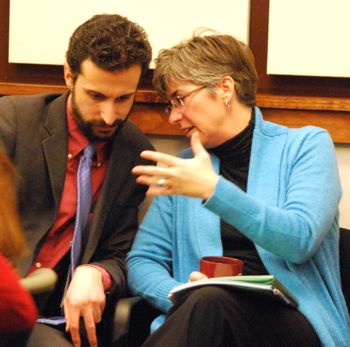
County commissioner Yousef Rabhi talks with Mary Jo Callan, director of the county’s office of community & economic development.
The county is one of several partners in the coordinated funding approach. Other partners include the city of Ann Arbor, United Way of Washtenaw County, Washtenaw Urban County, the Ann Arbor Area Community Foundation, and the RNR Foundation. It began as a pilot program in 2010, and has been extended twice since then. The most recent extension was approved by the county board at its Nov. 6, 2013 meeting, and authorized the allocation of children’s well-being and human services funding for 2014 through 2016. That resolution also authorized the continued management of those funds through the county’s office of community & economic development (OCED), using the coordinated funding approach – with some modifications.
The coordinated funding process has three parts: planning/coordination, program operations, and capacity-building. The approach targets six priority areas, and identifies lead agencies for each area: (1) housing and homelessness – Washtenaw Housing Alliance; (2) aging – Blueprint for Aging; (3) school-aged youth – Washtenaw Alliance for Children and Youth; (4) children birth to six – Success by Six; (5) health – Washtenaw Health Plan; and (6) hunger relief – Food Gatherers.
At the board’s Jan. 22, 2014 meeting, OCED director Mary Jo Callan told commissioners that the resolution brought forward that evening was in response to a request made by commissioner Conan Smith (D-District 9) last year. He had raised concerns about county departments competing with community groups for coordinated funding dollars. He had argued that if the county programs were worth funding, then the county should fund those programs directly. This resolution formally prohibited county programs, with some exemptions, from applying for coordinated funding.
Coordinated Funding: Public Commentary
Lefiest Galimore raised concerns about the coordinated funding approach to supporting human services. It’s blocking a certain segment of nonprofits from providing services, he said, and he urged commissioners to take a look at this problem. Essentially the same organizations are being funded from one cycle to the next, he said, and it doesn’t appear that there’s any accountability. He also criticized the argument that some groups shouldn’t be funded because they don’t have the capacity to provide services. Smaller organizations have fewer resources, he noted, so they aren’t able to do as much as larger entities – and he indicated that they shouldn’t be compared in the same way.
Coordinated Funding: Board Discussion
Conan Smith (D-District 9) asked Mary Jo Callan how much coordinated funding is received by the Project Outreach Team (PORT). Callan wasn’t sure, but thought it was about $100,000. Smith said he really believed that coordinated funding should be a community grant program, and that if a county program needs funding, “we should just fund that program, not tell them to go through a competitive grant program with an outside set of decision-makers.” He said he’d support the resolution, but thought a better approach would be to simply fund PORT directly. It would open up more funding for other community groups that aren’t part of the county infrastructure, he noted.
Yousef Rabhi (D-District 8) agreed with Smith. He asked what the funding source was for the money that PORT receives through coordinated funding. Callan replied that PORT’s funding comes from the city of Ann Arbor. She noted that the city had funded PORT for many years, prior to the coordinated funding program.
Ronnie Peterson (D-District 6) also agreed with Smith, saying it would be unfair for a county department to compete against a local nonprofit. He said he had expected to see additional issues addressed as well – issues that had been raised during the board’s discussion on Nov. 6, 2013. County administrator Verna McDaniel replied that other issues would be addressed separately.
Andy LaBarre (D-District 7) asked if this resolution would result in the county excluding itself from meeting a need. “Are we leaving something on the table that we really shouldn’t?” Callan replied that she didn’t think that was the case, especially because the policy specifically allowed a county department to act as a fiduciary for a nonprofit that would otherwise be ineligible for coordinated funding. The sheriff’s office, for example, has acted as fiduciary for a program that provides a lot of services to the community, she said, even though it isn’t a 501(c)3 nonprofit.
Outcome: Commissioners gave initial approval to the new policy regarding coordinated funding. A final vote is expected on Feb. 5.
Dog Licenses
Commissioners were asked to give initial approval to a proposed ordinance that would allow the county to issue municipal civil infractions for owning an unlicensed dog. [This ordinance would not apply to Ann Arbor residents, as the city of Ann Arbor has its own dog licensing program.]
The proposal would also establish that the county treasurer’s office to be the bureau for administering these infractions, and would set new licensing fees. [.pdf of proposed dog license ordinance] The board held a public hearing about this proposal on Jan. 8, 2014 when one person, Thomas Partridge, spoke. The board had held a previous hearing at its meeting on Oct. 16, 2013, but it occurred after midnight and no one attended.
More than a year ago, at the county board’s Nov. 7, 2012 meeting, commissioners approved a civil infractions ordinance that gave the county more flexibility to designate violations of other county ordinances as a civil infraction, rather than a criminal misdemeanor. For example, enforcement of the county’s dog licensing ordinance is low because the current penalty – a criminal misdemeanor of 90 days in jail or a $500 fine – is relatively harsh. The idea is that enforcement would improve if a lesser civil infraction could be used. The new civil infraction fines would be $50 for a first offense, $100 for a second offense, and $500 for a third or any subsequent offense.
An increase in the enforcement is expected to result in an increase in the number of dog licenses, which would provide additional revenue to be used for animal control services.
A draft resolution and staff memo had been prepared in November 2013 but the item was not brought forward to the board for a vote last year. The current proposal is similar to that initial draft. [.pdf of Jan. 22, 2014 resolution and memo]
The county treasurer’s office also is proposing to lower the current dog licensing fee from $12 to $6 per year for spayed or neutered dogs and from $24 to $12 per year for dogs that aren’t spayed or neutered. There would continue to be a discount for a three-year license. There would be no charge to license service dogs, with proper documentation and proof of rabies vaccination. More information about current dog licenses is available on the county website.
Deliberations at the Jan. 22 meeting included the importance of outreach to educate residents about the changes.
Dog Licenses: Board Discussion
Dan Smith (R-District 2) urged residents to license their dogs. The fine for a first offense is $50, he noted, which would be waived if the owner subsequently secures a license. The maximum fee for a three-year license is $30.
Ronnie Peterson (D-District 6) thanked the treasurer’s office for developing this proposal. He wondered what kind of educational information would be available to residents. He hoped the county would invest in some kind of educational component, especially for something that had a fine attached to it.
Alicia Ping (R-District 3) fully supported the idea of educational outreach, especially for rural areas. “Lots of people have lots of dogs in barns,” she said, and they aren’t necessarily aware of this ordinance. She also wondered if township offices could be allowed to sell licenses, at least during an initial period, so that it would be more convenient for residents who don’t live in Ann Arbor, where the county administrative offices are located.
County treasurer Catherine McClary came to the podium and thanked the board for acting on this ordinance. She said she sees it as a public health issue – the purpose of licensing a dog is to prove that the dog has a rabies vaccination. “I don’t see it as a punitive measure,” she said, and agreed with the need for public education.
Although the ordinance could take effect 50 days after the board’s final vote, McClary told the board that she was contemplating an effective date even later – perhaps sometime this summer – to provide enough time for a proper rollout. One thing her office is considering is to send a mailing to every property owner in the county. When they did something similar about 10 years ago, dog licensing doubled, she reported. It’s been relatively flat since then.
The treasurer’s office has been handling dog licenses for the city of Ypsilanti for about a year, McClary said. It’s also possible for township treasurers to sell the county licenses, if they choose to do that. She noted that in the past, the township treasurers were given dog tags to sell, but there was no accounting for how many licenses were sold. There also was no central database for that approach, she said. Now, the paperwork can be handled by the townships, but the county treasurer’s office keeps the central database and mails out the actual dog tags. It’s also possible for residents to apply online, by mail or by fax.
Some veterinarians also sell licenses, McClary said, and she’d like to expand that to other vets in the county. Conan Smith (D-District 9) encouraged that approach, calling it an easy point of contact for responsible pet owners.
Yousef Rabhi (D-District 8) noted that when Conan Smith was chair of the board, “he had to deal with a very, very difficult process … in how we fund animal control in Washtenaw County.” [Rabhi was alluding to negotiations with the Humane Society of Huron Valley over how much financial support the county would provide to HSHV.] Revenue from dog licenses was a part of that conversation, Rabhi noted. In contrast, the process of bringing forward this new ordinance happened “without too many aches and pains,” he said. Rabhi also stressed the need for educational outreach to dog owners.
Rabhi noted that the licensing fee can only be used to pay for administrative costs. He wondered how the revenue from fines is distributed. McClary replied that the fine revenue is divided between the courts, the county and possibly the district libraries, which receive revenue from penal fines. She said she’d provide the board with additional information about how the revenue from fines is allocated.
Rabhi encouraged McClary to consider allowing parks staff to issue citations, because many people bring their dogs to county parks. McClary said she’d talk with parks & recreation director Bob Tetens about whether some of his staff could be deputized for that purpose.
McClary also pointed out that there’s no uniformity with the city of Ann Arbor, which issues its own licenses and has a separate fee structure. At some point, after the new county program has been running for a while, McClary said she’d like to start discussions with the city of Ann Arbor about possibly coordinating their programs.
Rabhi noted that the county funds the HSHV, which provides services in Ann Arbor too. He appreciated that Ann Arbor was starting to help pay for that, but it seemed like there was still a duplication of services in some cases – like dog licensing – and resources weren’t being aligned in order for the licensing program to be most effective.
Outcome: The board gave initial approval to the ordinance allowing the county to issue municipal civil infractions for owning an unlicensed dog. A final vote is expected on Feb. 5.
Health Care Coverage for Autism
Diane Heidt, the county’s human resources and labor relations director, gave a presentation on a proposal that the county administration plans to make formally to the board at a future meeting: To begin offering health care coverage to county employees for the treatment of autism. She began by introducing Colleen Allen, CEO of the Autism Alliance of Michigan, who was on hand to answer questions.
Heidt noted that last fall, commissioner Conan Smith (D-District 9) had directed staff to research mental health parity, specifically focusing on autism coverage. Mental health parity refers to recognizing mental health conditions as equivalent to physical illnesses, and Washtenaw County has been a leader in providing mental health coverage, Heidt said, even before federal mandates. But one area where there isn’t parity is autism.
It hasn’t been included so far because of cost considerations, Heidt told commissioners. The county continues to recover from the economic downturn, but more recently the staff became aware of resources that are available to help provide coverage.
The federal Mental Health Parity & Addiction Equity Act of 2008 mandates that any group plan with 50 or more members – like Washtenaw County government – must offer both medical and mental health benefits. Under more recent federal health care reform, there’s been an expansion of benefits, and mental health benefits are considered a mandatory part of basic health care, starting this year.
On the state level, in October 2012 a state of Michigan mandate took effect stating that all fully insured plans must provide coverage for the diagnosis and treatment of autism spectrum disorders (ASD). The county is not a fully insured plan, Heidt explained. Rather, the county is self-funded, and so it was exempt from this state mandate.
Heidt described how ASD has become more common over the past few decades – 1 in 88 children are now diagnosed with ASD. That increase is related in part to increased awareness, she noted. Intervention can include medicine, behavioral treatment, or a combination of both.
The costs are estimated to be about $60,000 a year to cover a child with autism. The state of Michigan has made coverage a priority, Heidt said, and has started setting aside funds to reimburse organizations that provide coverage. In fiscal 2012-13, $15 million was made available, with an additional $11 million in fiscal 2013-14. Of that, only about $500,000 has been expended on reimbursements. The program is handled by the Michigan Dept. of Insurance and Financial Services.
The state program provides for reimbursement of up to $50,000 per year per child between the ages of 0 to 6, up to $40,000 per year from ages 7-12, and up to $30,000 per year for ages 13-18.
For Washtenaw County, Heidt estimated that offering the coverage would result in up to a 5% increase in medical expenses, or up to $1 million annually. This year, medical expenses are budgeted at about $20 million, Heidt said. The county would be fully reimbursed by the state of Michigan for the amounts that are allowed under the autism program.
Heidt said the county administration is recommending that starting Jan. 1, 2015, the county would offer a rider for autism coverage as part of its health benefits, as long as the state’s reimbursement program remains in effect. They would re-evaluate it on an annual basis, she said.
It would be possible to offer the benefit even earlier, Heidt noted – as soon as 90 days after approval by the board.
Health Care Coverage for Autism: Public Commentary
Ryan Schuett introduced himself as a Washtenaw County employee in support of the autism coverage that the board would be considering. He said he’s the father of a three-year-old autistic child who was diagnosed last year. He and his wife were happy to get a diagnosis, and started looking at treatment options. They initially weren’t concerned because they knew that the county provided great health care coverage, he said. But they learned that autism isn’t covered, and that has created a hardship for his family and other employees. He supported the change in coverage.

Michelle Schuett, right, spoke to county commissioner Felicia Brabec, far left, and Diane Heidt, the county’s human resources and labor relations director.
Michelle Schuett, who is married to Ryan Schuett, also spoke in support of the health care coverage to include treatment for autism. In the past year, her family paid for private insurance so that they could afford treatment for their daughter. She described how much of an improvement it made in her daughter’s ability to communicate. But they couldn’t continue to afford that insurance, she said, so they’re excited that the county board is considering coverage of it.
Health Care Coverage for Autism: Board Discussion
Conan Smith (D-District 9) said the county is learning more about autism and how many people are suffering from it. The county’s public policy hasn’t kept up with the needs for families. He thanked the Schuetts for putting a human face on an issue that the county can do something about. “It’s very courageous of you to stand up like that,” he said.
Felicia Brabec (D-District 4) noted that there’s a $10,000 difference between the estimated annual costs for treatment and the top amount that the state would reimburse. Who picks up that difference? she asked.
Colleen Allen of the Autism Alliance of Michigan explained that as a self-funded entity, the county could decide how much it offers as coverage – it could be more than the state reimbursement, or less. She also noted that if left untreated, costs will emerge in other ways later in life – if a child needs special education, for example, or can’t be employed.
Several commissioners expressed support for the coverage. Ronnie Peterson (D-District 6) felt the county should make a long-term commitment, and not rely on state reimbursement. He hoped the board could appoint a committee that would investigate the cost and sustainability of this type of coverage, and recommend a policy for funding coverage if the state reimbursement fund is exhausted.
Andy LaBarre (D-District 7) noted that his wife is a special education teacher, and the parents of the children she teaches are those who deal with this firsthand. He pointed out that the hours missed from work in dealing with a child who has ASD, not to mention the emotional toll, will affect productivity. The coverage will actually pay dividends in other ways in the future, he said. He volunteered to serve on the committee that Peterson suggested.
Conan Smith said he had initially thought the county had already offered this benefit. He reported that his wife, state Sen. Rebekah Warren, had asked him about it, and he then learned that it wasn’t coverage that the county offered. In terms of costs, he noted that applying national statistics to the number of county employees, it’s likely that only about 16 children of employees would be affected with some form of ASD. If each child needed the extra $10,000 per year in coverage – beyond what the state would reimburse – that would be a total of $160,000, he noted. He advocated for adopting the highest coverage, and he’d like to track how many employees actually access it.
Smith also supported offering the coverage as early as possible, rather than waiting until 2015.
Outcome: This was not a voting item.
Health Care Coverage for Autism: Committee
Later in the meeting, Yousef Rabhi (D-District 8) brought forward a resolution to appoint commissioners Felicia Brabec (D-District 4), Andy LaBarre (D-District 7) and Ronnie Peterson (D-District 6) to a committee related to the health care benefits for autism. The committee’s charge was to (1) investigate the cost and sustainability of coverage of autism spectrum disorders; and (2) recommend a policy providing and funding coverage if the state reimbursement fund is exhausted.
The committee was asked to report back to the full board on Feb. 5.
Outcome: Commissioners voted to confirm the appointments to this new committee.
Health Care & Pension Benefits
Diane Heidt, the county’s human resources and labor relations director, prepared an update on the county’s overall health care and pension benefits. She provided a handout to commissioners, but did not make a formal presentation. [.pdf of health care and pension benefits presentation]
Alicia Ping (R-District 3) noted that some companies have required testing of new hires to make sure they’re nicotine-free. It wouldn’t apply to current employees, but Ping wondered if it’s something that the administration has considered for new hires. County administrator Verna McDaniel said it’s something they’d need to do more research on before bringing a recommendation to the board.
Conan Smith (D-District 9) asked Heidt if she could compile dollar amounts to show the county’s health care expenditures over the last decade, for both active employees and retirees.
Outcome: This was not a voting item.
PACE Program
Commissioners were asked to give initial approval to establish a countywide Property Assessed Clean Energy (PACE) program.
The board had issued a notice of intent to create the program at its meeting on Jan. 8, 2014.
The goal of PACE is to help owners of commercial (not residential) properties pay for energy improvements by securing financing from commercial lenders and repaying the loan through voluntary special assessments.
The county’s proposal entails joining the Lean & Green Michigan coalition and contracting with Levin Energy Partners to manage the PACE program. Andy Levin, who’s spearheading the PACE program statewide through Lean & Green, had attended a Dec. 4, 2013 board meeting to answer questions. State Sen. Rebekah Warren also spoke briefly during public commentary on Dec. 4 to support the initiative. She was instrumental in passing the state enabling legislation to allow such programs in Michigan.
The law firm of Miller, Canfield, Paddock & Stone would act as legal counsel. Several other counties are part of Lean & Green, according to the group’s website. Other partners listed on the site include the Southeast Michigan Regional Energy Office, which was co-founded by county commissioner Conan Smith. Smith is married to Warren.
On Jan. 22, Levin again briefly addressed the board during public commentary, as did several business owners who supported the PACE initiative. The board also held a former public hearing on the proposal later in the evening, but Levin and others had left by that point and no one spoke during the formal hearing.
The county’s PACE program would differ from the one set up by the city of Ann Arbor, which created a loan loss pool to reduce interest rates for participating property owners by covering a portion of delinquent or defaulted payments. Washtenaw County does not plan to set up its own loan loss reserve, and no county funds would be used for the program, according to Levin.
However, a reserve fund is mentioned in documentation that describes the program:
8. Reserve Fund
In the event Washtenaw County decides to issue bonds to provide financing for a PACE Program, Washtenaw County can determine at that time to fund a bond reserve account from any legally available funds, including funds from the proceeds of bonds.
By participating in LAGM [Lean & Green Michigan], Washtenaw County assists its constituent property owners in taking advantage of any and all appropriate loan loss reserve and gap financing programs of the Michigan Economic Development Corporation (“MEDC”). Such financing mechanism can similarly be used to finance a reserve fund.
[.pdf of PACE program documentation] [.pdf of PACE cover memo] [.pdf PACE resolution]
PACE Program: Public Commentary
Six people addressed the board during public commentary about the PACE program. Kicking off the commentary was Andy Levin of Lean & Green Michigan. He told commissioners that some property owners and contractors had attended the meeting to speak about PACE and how the program affects their businesses. He thanked the board for moving the program forward.
Paul Brown introduced himself as an Ann Arbor and Washtenaw County citizen, who has spent his career working in finance. That includes some time spent working with Levin when Brown was vice president of capital markets at the Michigan Economic Development Corp. One of his tasks was to look at private capital markets, Brown said, especially those that didn’t work efficiently, and to try to “fill those gaps.” A lot of energy efficiency projects have a relatively long payout, he said, yet financing for that type of upgrade is of a relatively short duration. That results in a negative cash flow for the business. Brown described PACE as a revolutionary finance mechanism that allows a business owner to finance the project during its practical life, which makes it a cash-flow-positive scenario. When he was working for the state, Brown said, PACE was particularly attractive because it helped fill a financing gap.
The state’s rule of thumb is if they can put in 10% capital and get a 10-to-1 leverage in economic activity, that’s a win, Brown said. PACE creates the economic activity with contractors and installation, but it also upgrades the infrastructure of buildings, which makes Michigan more competitive as a state, he said. One of the difficult things about Michigan is that its energy costs are relatively high, compared to other states. Combine that with a relatively old infrastructure, he added, and that’s a “double whammy,” making it difficult to become a competitive environment. PACE allows businesses in the state to help correct some of those inefficiencies and make them more competitive, Brown concluded.
The next speaker was Scott Ringlein, president and CEO of The Energy Alliance Group of Michigan, a partner of Lean & Green Michigan. He described a current project that they’re working on for McDonald’s in Washtenaw County – installing a geothermal system for about $85,000. With existing programs, like Michigan Saves, the business would only get financing for a 60-month period. But with PACE, that financing could be extended to 10-20 years, he said, which would result in immediate positive cash flow. A lot of technologies that are used for energy efficiency have a life of 20-30 years, Ringlein said. Another advantage is that the financing is tied to the property, not the business, he noted.
Alexis Blizman, policy director for the Ann Arbor-based Ecology Center, also supported the countywide PACE program. The economic benefits of the program and the ability for businesses to save money are really important, she said, but the program also benefits the environment. Investments in energy efficiency can significantly reduce greenhouse gases, she said, and help mitigate climate change. It’s the best way to reduce stress on the energy grid, to eliminate the need for new power generation, and to allow for time for the market to change so that the price of renewable energy decreases. She urged commissioners to support the program.
Mike Larson of Simon Property Group – developers of Briarwood Mall – also supported the PACE initiative, saying it allowed businesses to do projects that otherwise wouldn’t be possible. Briarwood Mall recently underwent a significant renovation, he noted. Upgrades included replacing all the lights with LED lighting – a costly but important change, he said. Larson concluded by urging commissioners to adopt the PACE program.
Zach Mathie of Patriot Solar Group in Albion, Michigan, expressed support for the county’s PACE program. It’s good for businesses, the community, and renewable energy, he said.
County treasurer Catherine McClary, speaking later in the meeting about the dog licensing agenda item, also addressed the board about the PACE program, saying there are compelling reasons to support it. From the perspective of the treasurer’s office, if a PACE project is delinquent, it would be no different than anyone else who might have a delinquent tax or special assessment, she said. Her office would initially advance money to the county to cover it, but if she couldn’t recover the delinquent taxes or assessment in a foreclosure or auction, then the county would have a charge-back and repay those funds.
The charge-back is one of two risks that McClary identified. The second risk is if an entity that’s exempt from special assessments – like a local government – purchases the property at a foreclosure auction. In that case, the stream of revenue from the special assessment would no longer be available. That risk can be mitigated if it’s clear that the financing entity, such as a bank, accepts the risk rather than the county. She said she’d be glad to work with whoever administers the program to ensure that the county taxpayers are protected.
The board also held a formal public hearing on the PACE program later in the evening. No one spoke during at that time.
PACE Program: Public Commentary – Board Response
Conan Smith (D-District 9) thanked the speakers who had supported PACE, noting that many of them had come from long distances. The county has supported this kind of environmental initiative and has enjoyed being on the forefront of innovation, he said. He hoped that by mid-February, there would be a PACE program that businesses could take advantage of in Washtenaw County.
Yousef Rabhi (D-District 8) also said he appreciated hearing from supporters of the PACE program, and he looked forward to acting on that.
There was no other discussion of this item before the board vote.
Outcome: Commissioners gave initial approval to establish a countywide Property Assessed Clean Energy (PACE) program. A final vote to establish the program is expected at the board’s Feb. 5 meeting.
Communications & Commentary
During the meeting there were multiple opportunities for communications from the administration and commissioners, as well as public commentary. In addition to issues reported earlier in this article, here are some other highlights.
Communications & Commentary: Staff to Support Board’s Budget Priorities
Toward the end of the meeting, Ronnie Peterson (D-District 6) asked about an item that was on the Jan. 22 agenda, but not discussed. The item was listed as part of the county administrator’s report, and referred to direction that the board had given to county administrator Verna McDaniel at the board’s Nov. 20, 2013 meeting: To research and recommend staffing options that would support the board’s community investment priorities.
Peterson said he assumed that this directive emerged from a meeting of the board’s leadership. Addressing board chair Yousef Rabhi, Peterson said: “Give me some history … regarding this position, and where you’re going with it.”
Rabhi reminded Peterson that the board had discussed the need to continue the budget process beyond just a vote to approve it, which was taken at the end of 2013. McDaniel reported that she’s still gathering information in order to develop a recommendation. She planned to bring something to the board at a future meeting, and said she’s been working with Felicia Brabec (D-District 4) and other commissioners on a proposal. [Brabec is chair of the board's ways & means committee, on which all commissioners serve. She also led the board's budget process.]
Brabec added that with a four-year budget, the board also set up a new strategic model to help them determine where the county’s resources should go. To do that, the board needs some staff support, she said. The board set goals as well as outcomes that are intended to measure how those goals are being achieved. If the board doesn’t continue to move forward on these things, “there was really no point in doing that process,” she said.
Peterson said it sounded really vague to him. Brabec replied that they need to do a needs assessment and gap analysis – that’s the first step. Peterson contended that “somewhere, some major strategy is being laid” – he had read all of the budget documents, he said, and it wasn’t clear to him what was being proposed. He asked whether the proposal is simply a series of reports. He criticized commissioners for not paying attention to the agenda item that had mentioned the staffing recommendation.
Conan Smith (D-District 9) said his expectation was that the recommendation wouldn’t call for reports, but would be for staffing. He had hoped that McDaniel would hire a senior-level position, but she’d heard from other commissioners that such a position wasn’t broadly supported. “I think the reason you don’t have something in front of you today is that there’s tension about how we effectively staff the function that we’re describing,” Smith said. He expected McDaniel will now bring forward a job description or scope of work for a contracted position. He hoped the person would attend board meetings or working sessions to provide regular updates, and to work with the county’s senior staff and department heads as this process moves forward.
Peterson wondered how they arrived at this decision. It was important to discuss this as a board, he said. He criticized the board leadership, saying that part of their role is to communicate with other commissioners.
By way of background, the board – including Peterson – discussed this issue at length at its Nov. 20, 2013 meeting. From The Chronicle’s report of that session:
Regarding the “community outcomes” document and the revised budget document that now included a section on “community impact investing,” Peterson wondered if there was any indication about the amount of staff time and resources that would be required to implement this approach. He said he didn’t have a problem with the budget priorities themselves, but it wasn’t clear how those priorities would be carried out, or what line item in the budget was designated for this purpose. He said he’d like to see a timeframe for how the board could start addressing these priorities during the remainder of their term, which runs through 2014. Was any of this information in the budget document? he asked.
Felicia Brabec (D-District 4) replied, saying that the revisions added to the budget document on community impact investing had stemmed from the community outcomes resolution that was also on the Nov. 20 agenda. Other commissioners have raised similar questions about how these outcomes will be implemented, she said. The county administrator, Verna McDaniel, will be taking the lead on that. Brabec pointed to text in the revised budget document that outlined this approach: “The County Administrator will bring a planned recommendation to implement the Community Impacts process with appropriate staffing and budget at the first business meeting in 2014, January 22, for BOC approval.”
Where will the funding come from to implement this process? Peterson asked again. The county already has a lot of obligations, he noted.
Rabhi responded to Petersen, saying that in the previous two-year budget approach, the first year would be spent developing the budget, but the second year would be focused on other things. The intention of the proposed four-year budget and community outcomes approach is to help keep the board involved in the budget as a “living document,” Rabhi said, and to have an active role in managing the budget as circumstances change.
The Feb. 5 agenda now includes an item that would authorize the “creation of a contractual, qualified professional position to assist the BOC to develop strategies and provide oversight for the integration of the Board-defined community impacts and outcomes into organizational and departmental programs, policies and budget priorities.”
According to a staff memo, the position would report to the county administrator, and compensation would not exceed the scope of the administrator’s authority. [.pdf of staff memo and resolution on Feb. 5 agenda]
Communications & Commentary: Road Funding
Alicia Ping (R-District 3) reported that a subcommittee that’s exploring the future of the Washtenaw County road commission had met prior to the county board meeting that night. The subcommittee, which Ping chairs, had voted to ask the county board to pass a resolution urging Gov. Rick Snyder to allocate the state’s budget surplus for road repair, distributed to local entities using the current state formula for road allocations. [A resolution on this issue is now on the board's Feb. 5 agenda.]
Communications & Commentary: Mayoral Race
At the end of the Jan. 22 meeting, Yousef Rabhi (D-District 8) reiterated his statements from earlier in the month that he would not be running for the mayor of Ann Arbor this year. He restated his commitment to the county board.
The Chronicle queried another Ann Arbor commissioner, Democrat Conan Smith (D-District 9), about the possibility of a mayoral candidacy or a decision to run for re-election to the county board. Smith’s reply, via email on Jan. 23: “I haven’t made any decisions about 2014 at all at this point.”
Present: Felicia Brabec, Andy LaBarre, Kent Martinez-Kratz, Ronnie Peterson, Alicia Ping, Yousef Rabhi, Conan Smith, Dan Smith.
Absent: Rolland Sizemore Jr.
Next regular board meeting: Wednesday, Feb. 5, 2014 at 6:30 p.m. at the county administration building, 220 N. Main St. in Ann Arbor. The ways & means committee meets first, followed immediately by the regular board meeting. [Check Chronicle event listings to confirm date.] (Though the agenda states that the regular board meeting begins at 6:45 p.m., it usually starts much later – times vary depending on what’s on the agenda.) Public commentary is held at the beginning of each meeting, and no advance sign-up is required.
The Chronicle could not survive without regular voluntary subscriptions to support our coverage of public bodies like the Washtenaw County board of commissioners. Click this link for details: Subscribe to The Chronicle. And if you’re already supporting us, please encourage your friends, neighbors and colleagues to help support The Chronicle, too!




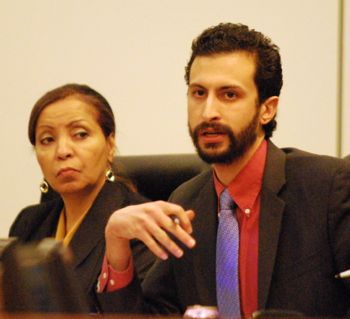
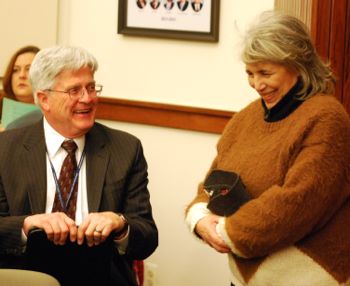
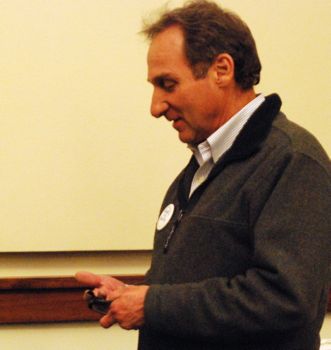
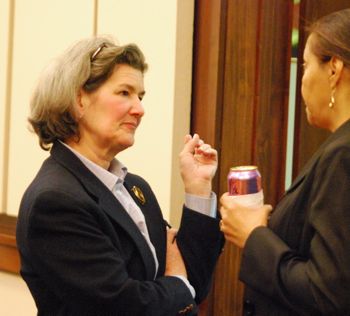
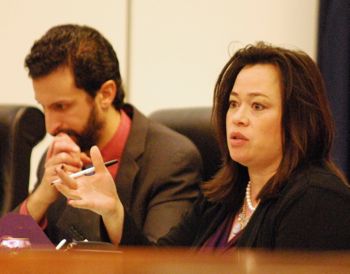
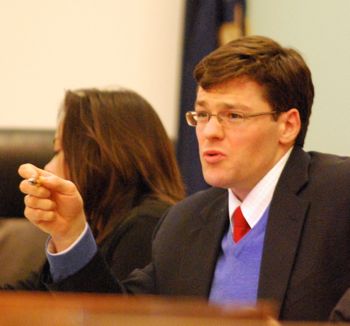
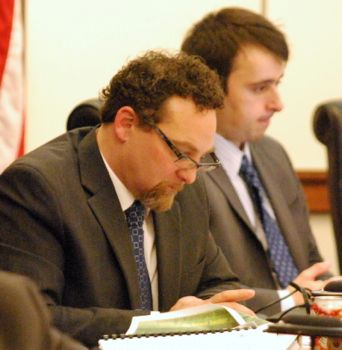
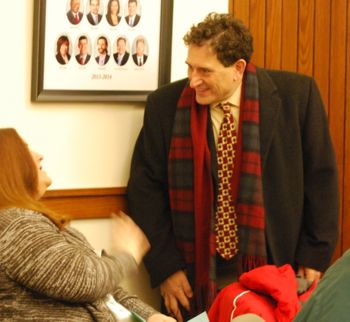
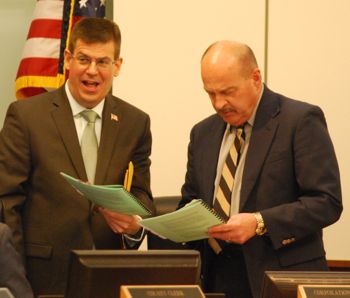
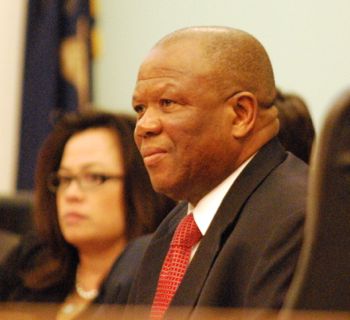
When we went through the lengthy process that resulted in the County’s building the Delonis Shelter, housing advocates resisted boosting the size of the emergency shelter (an early proposal would have had 200 beds) because we would view homelessness as a temporary condition soon terminated by transition into permanent housing. That was the premise of the “Blueprint”. We could certainly use those extra beds now.
The question officials and all of us must consider is whether we will need to find a way to accommodate a growing population of semi-transient homeless who can’t be housed in any existing subsidized shelter or housing and/or resist any institutional solutions in favor of a more independent existence. There may be some partial solutions that don’t fit our usual boxes.
Of course, part of the problem here is that we have national trends that are feeding the increase in this population, from job loss to continued lack of mental health support. The growth in inequality of income and the abandonment of our working class by corporate America is something that we may not be able to “fix” on the local level. The need will simply overwhelm our resources.
That is what happens when local government bodies try to deal with national problems. In this area that has gone on for decades. Perhaps sometime the city, county, school system could grow up and deal with the local problems that are within their resources and remit and stop messing around with foreign policy, immigration, income redistribution and other items that are not.